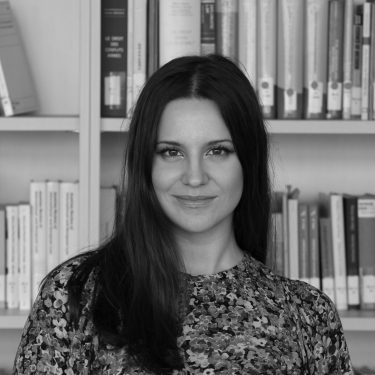Welcome to the latest interview of the Völkerrechtsblog’s symposium ‘The Person behind the Academic’! With us we have Prof. Angelika Nußberger, and through the following questions, we will try to get a glimpse of her interests, sources of inspiration and habits.
Welcome Prof. Nußberger and thank you very much for accepting our invitation!
May I first ask, what it was that brought you to academia and what made you stay?
I think I ended up in academia by accident. I was open to working scientifically, but it was not my immediate or primary goal. I had studied law and Slavic studies, the Wall had fallen, and I felt that with my double degree the world was open to me. However, I also had a small child and was pregnant with a second one and wanted to work only part-time. Before I could really think about my future path, the director of the Max Planck Institute for Foreign and International Social Law in Munich called me – he didn’t know me, but had heard of me – to ask if I would like to work at the institute and take over the Russia department. My husband had a scholarship to Harvard Medical School, and of course I wanted to go to Boston with him. A Max Planck position seemed incompatible with that. But I was offered a half-time position at the institute without compulsory attendance, so I was free to leave for the US. This offer was so tempting that I couldn’t help but accept it. But with that, I had also embarked on the path to habilitation.
To be honest, though, I later hesitated whether I should stay in academia. Many other things also seemed very tempting to me. But it was above all the great freedom of being able to shape my work very independently and to choose my focus according to my interests that ultimately persuaded me to stay in science.
If you were not an academic, what would you be?
It’s hard to say. I got to know the work in a law firm, and I must say that I liked it. As a judge, I was very happy as well. But also in ministries, it seemed to me, you can achieve a lot. Maybe I would have decided at some point to become a journalist, I always liked writing. I really don’t know.
Which are three texts that you would wish all academics working on international law would read?
I don’t think there are three books that all international lawyers should have read. There are so many books that are inspirational, and each one speaks to something different. For me, Mary Ann Glendon’s book “A World Made New. Eleonor Roosevelt and the Universal Declaration of Human Rights”, was a text that left a lasting impression on me. In it, she traces how the Universal Declaration of Human Rights came to be, how ideas were gathered from around the world, how people tried to complete the work in the difficult circumstances of the time, how many layers overlap in the text that reads to us as if it should be this way and no other. Above all, the book shows how much international law is shaped by individual personalities who have a strong will and vision.
The book that drew me to international law was “Epochen des Völkerrechts” by Wilhelm Grewe. The development of international law ideas through the centuries showed me how everything came into being and grew, and how much international law is interwoven with history and politics. With this book, I simply learned a lot. And it sparked my curiosity about international law.
As a third book I would perhaps mention a very simple and not even an original book on international law – the small work “The Rule of Law” by Tom Bingham. In it, he shows how a very complex and fundamentally important concept of law can be summed up in just a few strokes. I was fascinated by that. But also in terms of content, it’s a text I come back to again and again in my work.
But this is a very personal selection, not suitable for an official canon.
Would you say that your upbringing has had an impact on your research interests?
My mother had studied mathematics and physics, my father was an engineer. At home, what was valued was what was precise and exact. Law and languages, which I was interested in, were the opposite. Nevertheless, I would say that my upbringing had a decisive influence on my professional ethos – it was always about wanting to understand and also about building, about shaping. My interest in Eastern Europe, on the other hand, has no relation to my biography. As a child of the Cold War, I was simply curious to see what it looked like on the other side of the Wall and how people thought there. This then brought me to the topic of international human rights in the 1990s, as it established the first lines of connection between West and East.
What is your favourite place to read and write? What is always near you when you read and write?
I like to read and write in my husband’s grandfather’s old armchair, with a cup of ginger-lemon tea beside me. I used to always need a desk, but now I just enjoy having my laptop on my knees.
What is an energy and inspiration booster, at times when you have none?
It always does me good to walk around the small lake that is near our house. Then I can switch off and start again.
Have you ever drawn influence from any form of art in your work? Is there anything artistic about teaching or writing academic texts?
Yes, I think art is very important to our profession. I have collaborated with illustrators twice, once in a – very personal – book about the experiences during the pandemic and now in a book explaining human rights for children and young people. Both are not legal books in the strict sense, but at least the latter is also about law. I myself cannot draw, my means of expression is language. But I think that if I want to make something clear, for example in a lecture or in a talk, it is always helpful to resort to pictures. I recently spoke at an exhibition opening by Jochen Stankowski, who has illustrated all the articles of the Universal Declaration of Human Rights. He can use them to express many things that I cannot explain with words alone. Music exhilarates me, but it is reserved for leisure time; it has no place in my legal work.
Which of your publications is your favourite one? And which of them is your least favourite?
My book on the European Court of Human Rights (published by OUP) is based on my nine years of experience at the Court; it is written with heart and soul and is my favourite one.
I would write my doctoral thesis very differently today. At the time, I just wanted to finish it quickly. So, I would call it my least favourite.
Which advice would you give to early career researchers reading this interview?
My experience is that paths are often not as straightforward as one might imagine. I think it is very important to be open to opportunities that arise unexpectedly. Young researchers should trust that life has exciting and beautiful things in store for them, even though they may not see them when they are writing their thick books and fear that nobody will be interested in their findings.
Would you like to share with us a ‘sacrifice’ that you have made for your work? Do you regret it?
Yes, I often didn’t have as much time for friends as I would have liked. I miss the long walks we could have taken together, the long evenings we could have spent chatting. I regret it, because I think it’s an illusion that you can make up later for what you’ve missed.
Ideally, whom would you want to find waiting for a meeting with you outside your office next Monday?
Simone Veil.
What are you working on currently? What may we anticipate in the near future?
Right now I am working on my Thomas Morus Lecture “Human Rights – Universalism in Retreat”. My next project is a second edition of my book on the European Court of Human Rights.
Thank you very much, Prof. Nußberger, for participating in our symposium and for having taken the time to respond to our questions!


Spyridoula Katsoni is Research Associate and PhD Candidate at Ruhr University Bochum’s Institute for International Law of Peace and Armed Conflict (IFHV).
